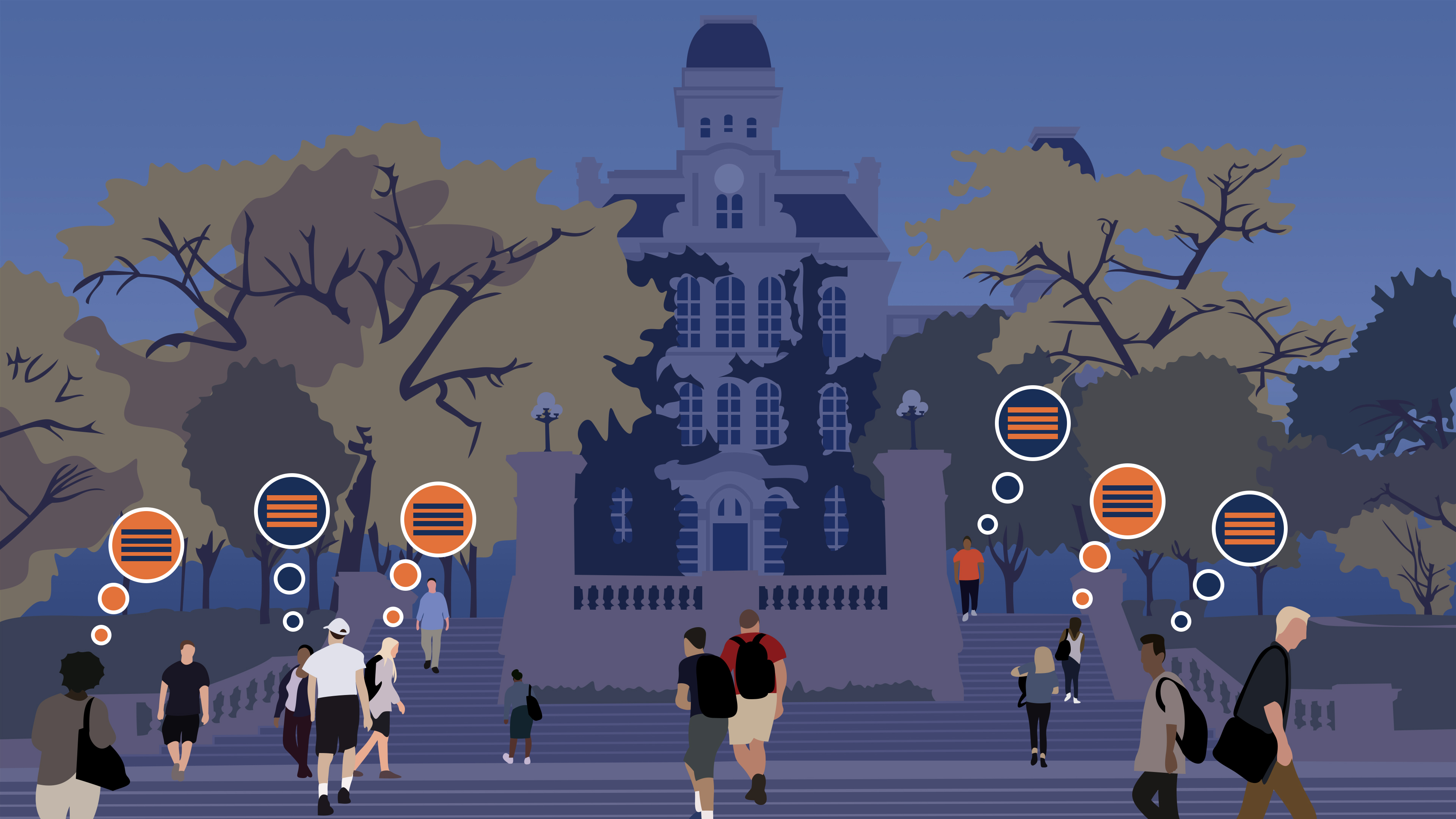The Instagram Activists
The Instagram Activsts
From racial inequality to sexual assault, Syracuse University students are leveraging social media accounts to bring attention to the biggest issues on campus.

t starts with an Instagram post. The big block letters spell out students’ stories of racism, discrimination, sexism, and bigotry, sometimes naming the people and organizations involved, and sometimes leaving followers to wonder. Next come the comments, most of which express disgust toward the situation and support for the anonymous sender.
People wonder why this happened, who was responsible, and what they can do to help. Anyone who tries to justify what transpired in the post is shut down quickly and unreservedly. Then, there are the texts, the whispers, the rumors. “Did you see?” “Did you hear?” “Did you know?” Well, did you?
Eventually, it seems like everyone is watching together; dragging their thumbs down their phone screens and waiting for the next post to appear. Such is the nature of accounts like @BlackatCuse, @BIPOC.Syracuse, and @SpeakOutCuse; platforms that arose shortly after the #NotAgainSU protests and gained notoriety the summer before the 2020 fall semester. This is when the familiar routine began, with many SU students captivated by what would come next.
For @BlackatCuse, “what came next” were instances of racism and discrimination against Black students on campus. For @BIPOC.Syracuse, the focus shifted towards the experience of Black and Indigenous students. And for @SpeakOutCuse, the content honed in on sexual assault and resources for survivors at SU. As of now, months after these accounts’ peak popularity, @BlackatCuse has retained nearly 4,000 followers, BIPOC.Syracuse managed to hold on to about 3,000, and @SpeakOutCuse has over 1,600 people still following the account.
As for the purpose of these platforms, the owner of @BIPOC.Syracuse, who will remain anonymous out of fear of backlash, says their account is all about giving students a space to be heard as well as resources to educate themselves. They said this mission became especially important to them after students were suspended for allegedly participating in the #NotAgainSU protests.
“I was like, the students need to have a voice about this and be able to share their experiences,” the owner of @BIPOC.Syracuse recalled about the original inspiration for the account.
Since its creation, @BIPOC.Syracuse has allowed Black and Indigenous people of color to share their stories about discrimination and racism on campus. In fact, the creator of the account, who runs the @LGBTQ.Syracuse platform, said they’ve already seen how their account has initiated some positive change at SU.
“[I’ve had] the people involved in the stories recognize that it was them and reach out to apologize, so that’s one big impact,” the @BIPOC.Syracuse owner said. “Another is, I’ve gotten a lot of white students reaching out and saying, ‘I didn’t really understand the gravity of the situation on campus before, and now I do.’”
Ultimately, however, both @BIPOC.Syracuse and @LGBTQ.Syracuse are about providing a space for students to vent their frustrations anonymously.
“I’ve posted some of my own stories and it’s so relieving to get support and to know that your feelings are valid,” said the account owner, who has recently disabled the @LGBTQ.Syracuse account because of the amount of time it takes to run.
Current SU student Dion Mills can relate to this kind of relief, having submitted multiple posts to the @BlackAtCuse Instagram. Both of her experiences had to do with white men openly using the N-slur and later justifying their behavior or refusing to take responsibility for the severity of their actions, even when confronted. When the men faced no major repercussions, she took to these accounts to share what had happened.
But while telling her stories was therapeutic for Mills, she said that the feeling was fleeting.
“I wish that there was something that could have been done from the university where they reached out and maybe started a focus group of all of us who said that we had these experiences,” she said.
Despite the awareness that these accounts continue to bostler, it seems that what typically ended up missing was their ability to enact real, tangible change directly after a story had been posted. However, to some of the students who have told their stories on these platforms, that doesn’t make the posts entirely powerless.
For students like Trinity Boyer, while anonymous posts don’t usually spark any immediate change, they still serve an important purpose. Boyer’s story, for instance, was posted on @BIPOC.Syracuse to describe how a group of ROTC boys made racist jokes about the Black girls in Boyer’s friend group while waiting in line for campus housing.
“I decided to tell my story because, with anonymous posts like those, many people have a hard time believing that it is true and factual,” Boyer said. “It was helpful for me and my friends because we’ve been wanting to tell others about what happened because we believe they were let off the hook for being misogynistic and racist, and we were left to feel bad and hopeless.”
Hairol Ma, an active commenter on several of these confessional accounts and an SU alumnus, said that seeing these accounts after graduating has been an eye-opening experience.
“The general vibe that I got from a lot of these stories is that these are students who have been feeling marginalized for a long time, but their voices weren’t necessarily paid attention to or heard,” Ma said.
These accounts have also exposed inappropriate behavior within certain organizations and institutions that Ma said she would not otherwise know about.
“[These accounts] help people like me, who have been totally isolated from organizations like Greek life, kind of just learn about what the institution looks like and also see these patterns that are happening.”
Of course, not all these stories are perceived as helpful or received as kindly. Romane Gutenbrunner posted a story on @BlackAtCuse with her name attached and said she did face some criticism.
“My post received backlash merely because I spoke of a professor who is known for being a Zionist and xenophobic toward her students,” Guttenbrunner said. “The backlash included being labeled anti-Semitic and not respecting freedom of speech.”
There have been similar posts made on both @BIPOC.Syracuse and @BlackAtCuse alleging inappropriate behavior against Palestinian students, even labeling the perpetrators as Zionist. However, these kinds of stories consistently seem to trigger outrage in the comments section, and one junior at Syracuse, who has chosen to remain anonymous for privacy reasons, explained why, from her perspective as a Jewish woman.
“While those running these accounts may not realize the harm of their anti-Israel posts, myself and my Jewish friends feel as if the posts made by @BIPOC.Syracuse used anti-Semitic rhetoric when discussing the Israeli/Palestinian conflict,” she said. “By deeming Israel a ‘racist’ nation, as their post did, you completely ignore the reason that nation exists in the first place.”
But despite her own qualms, this proud Jewish student still said that these accounts do generally help hold people accountable for their actions. Moving forward, she would like to see these platforms do more research about anti-Zionism and how it may actually be harmful to Jewish people.
Other critiques of these accounts include accusations of “cancel culture,” which involves shutting down, discrediting, or withdrawing all support from certain individuals. In fact, too many perceived attempts to “cancel” people or institutions can render these accounts extinct. Or at least this was the case with @SpeakOutSU, which was shut down after posting content accusing specific people of sexual assault.
After the account was deleted, some students took to social media to voice their concerns, saying that the account was an important resource for survivors of sexual assault on campus. The owner of @SpeakOutCuse, a replacement account for @SpeakOutSU, took notice.
“I was on Twitter that same day, and a lot of my friends were tweeting about how upset they were that a platform that was for survivors had fully been banned and deleted,” @SpeakOutCuse’s owner said. “I decided that if I wanted something done, then I should do it myself… so I decided to create the account that day.”

Mills considered @SpeakOutCuse more effective than some other accounts in initiating real change on SU’s campus. “I would say that that [account] has impacted people’s lives,” said Mills, who has contributed her experiences to the page. “Because I know of people who were in sororities and fraternities, and now their fraternity brothers won’t speak with them, or their friends won’t speak with them, or people have confronted them about it, and I think that is really powerful.”
Deconstructing the Divide
Torian Love, another active commenter on these accounts, agreed that @SpeakOutCuse has been especially important for survivors. “It is more than necessary for people to be able to say what happened to them and also warn other members of the community concerning behaviors,” Love said. “I think without these accounts, I personally would have a lot smaller sense of community and solidarity and love.”
While there may still be room for improvement, these accounts seem to be serving an important role that is ultimately changing the campus culture at SU. One that isn’t so much about rumors and petty drama, but rather space where students are given the platforms and resources to hold the administration and their fellow students accountable.
“I find these accounts so empowering,” Love said. “It’s an amazing feeling to know that you’re not alone.”

